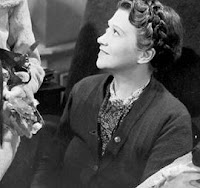Fay Bainter in “White Banners”
Lost the 1938 Best Actress Oscar to Bette Davis in “Jezebel”
Grade: ***
Perhaps the greatest comment on behalf of Edmund Goulding's understated “White Banners” is that it makes a great advertisement for small-town America: a place where issues can be presented and overcome with grace and solidarity. It must be conceded that, after the initial cosiness of the home is established, there’s a heavy dose of earnestness to this accessible melodrama. What makes the film in many ways superior to similarly moral-driven pictures is in the performances – of and either side of Fay Bainter – who help to shape it into a worthwhile model of family life.
Perhaps the greatest comment on behalf of Edmund Goulding's understated “White Banners” is that it makes a great advertisement for small-town America: a place where issues can be presented and overcome with grace and solidarity. It must be conceded that, after the initial cosiness of the home is established, there’s a heavy dose of earnestness to this accessible melodrama. What makes the film in many ways superior to similarly moral-driven pictures is in the performances – of and either side of Fay Bainter – who help to shape it into a worthwhile model of family life.
Of the ensemble Bainter’s Hannah remains most noticeably intriguing, predominantly because her character is less receptive to, or dependent upon, the influence of others, and her role as the film's insistent maid intentionally places her as the figurehead of the household. There are elements of self-righteousness to Hannah, which Bainter uses to allude to back-story – both within her half-hidden arc and outside of it. She finds ways to show how this woman has grown from her experiences, developed into a makeshift matriarch, turned dedication and presence into a valuable commodity to suit her needs. Long before the sympathies of the character are revealed, Bainter manipulates without offending – partly because she encounters little to no resistance, but also because she’s very difficult to distrust.
 But for all of these minor successes this method also works against her, and the nature of the film’s narrative in the first hour essentially limits the amount of impact that she can achieve. The dedication to a storyline involving Claude Rains’ inventor character consigns the performance to flashes of matronly self-lionisation which ultimately inhibit her greatly, and there isn’t enough teeth-sinking opportunity in the prolonged middle portion. “White Banners” takes until the hour mark to endeavour to really upset the apple cart, this coming in the form of an incrementally hinted-at revelation from Hannah’s past, which colours our view of her considerably, and allows this actress to finally furrow grief into a guarded pillar of efficiency.
But for all of these minor successes this method also works against her, and the nature of the film’s narrative in the first hour essentially limits the amount of impact that she can achieve. The dedication to a storyline involving Claude Rains’ inventor character consigns the performance to flashes of matronly self-lionisation which ultimately inhibit her greatly, and there isn’t enough teeth-sinking opportunity in the prolonged middle portion. “White Banners” takes until the hour mark to endeavour to really upset the apple cart, this coming in the form of an incrementally hinted-at revelation from Hannah’s past, which colours our view of her considerably, and allows this actress to finally furrow grief into a guarded pillar of efficiency.Bainter admittedly furnishes guilt and regret with a degree of plaintive mechanism in the final segment, but she does extricate emotion through revealing the character’s outlook to be more malleable and ambiguous than previously suggested. Her performance crystallises when the moment she has anticipated for most of the film eventually arises, and her concession of weakness when others force her to confront these issues from a different plain of thought brings added depth to Hannah. She’s given inklings of this before, but there’s mild surprise to the way in which she deals with the fraught collision of events that threatens to destruct. It can’t quite boost the resounding impact of her performance from congenial warmth to serviceable excellence, but it’s nontheless befitting of this emotionally intelligent, unendingly modest feature.

1 comment:
She's charming and handles the role with ease but it's all a bit limited.
Post a Comment